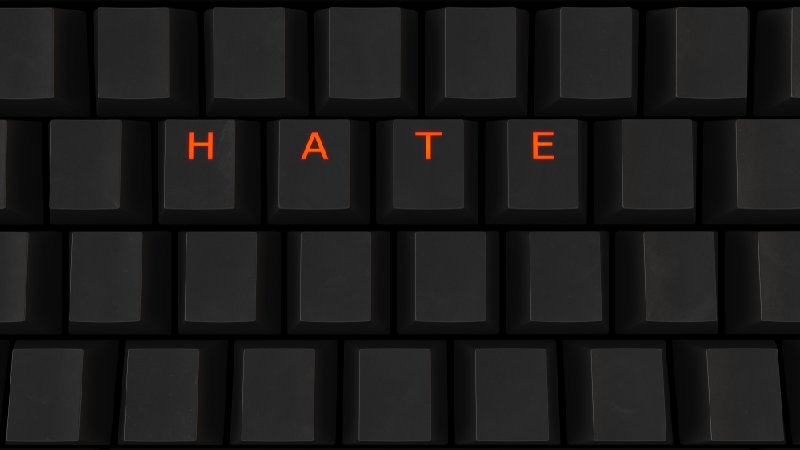
-
HOME
-
WHAT IS STANDOur Mission Our Values Our Help Contact
-
WHAT WE FIGHT FORReligious Freedom Religious Literacy Equality & Human Rights Inclusion & Respect Free Speech Responsible Journalism Corporate Accountability
-
RESOURCESExpert Studies Landmark Decisions White Papers FAQs David Miscavige Religious Freedom Resource Center Freedom of Religion & Human Rights Topic Index Priest-Penitent Privilege Islamophobia
-
HATE MONITORBiased Media Propagandists Hatemongers False Experts Hate Monitor Blog
-
NEWSROOMNews Media Watch Videos Blog
-
TAKE ACTIONCombat Hate & Discrimination Champion Freedom of Religion Demand Accountability
Your Right to “Say Anything” May Be Wrong
In the United States, and much of the world, freedom of speech and the right to practice one’s religion fall under the “inalienable” category—protected by laws, constitutions, declarations and basic principles of right and wrong.

Yet sometimes these rights seem to battle one another, such as when someone insists his “freedom of speech” includes bashing your religion.
I recently spoke with a lawyer whose practice centers around this exact dichotomy: he defends a person’s right to practice his religion, but within a murky gray area where protesting and freedom of speech collide with the right to practice religion.
I mentioned I planned to write a blog defining that line a little, separating the gray into black and white.
He laughed at me, “If you can do that, you should be on the Supreme Court.”
Well, I’m no lawyer, just a writer, a mom, an artist and a dreamer, perhaps. I’ve lived in the Midwest, the Bible Belt and the Pacific Northwest—ideologically quite different places, despite being “one nation, under God.” I’ve heard plenty of different opinions about what does and does not constitute freedom of religion.
But I do think I have a sense of where to draw the line, at least for each of us personally, if not legally. But it requires familiarity with a Scientology concept: the Eight Dynamics.
The Eight Dynamics
The concept of interconnectedness exists in every religion I’ve studied. In Christianity, for example, the importance placed on service to others in the manner of Christ and the idea that “we are all God’s children” implies that our actions, our interactions, matter.
A fundamental in Scientology, the Eight Dynamics, outlines this concept of interconnectedness very clearly. A short video describing the dynamics can be found here. As is stated on the webpage accompanying that video: “The basic command ‘Survive!’ which is obeyed by all of life, is subdivided into eight compartments so that each aspect of life can be more easily inspected and understood. These compartments are called the Eight Dynamics (dynamic meaning urge, drive or impulse).”
These dynamics are then delineated:
1. The First Dynamic is SELF—the individual.
2. The Second Dynamic is CREATIVITY—the family unit and the creation of families.
3. The Third Dynamic is GROUP SURVIVAL—one’s groups might include school, work, clubs, even religious congregations, any group of which one is a member.
4. The Fourth Dynamic is SPECIES. (Man’s fourth dynamic is the species of Mankind.)
5. The Fifth Dynamic is LIFE FORMS—animals and vegetation of every variety.
6. The Sixth Dynamic is the PHYSICAL UNIVERSE.
7. The Seventh Dynamic is the SPIRITUAL DYNAMIC—the urge to survive as spiritual beings and the urge for life itself to survive.
8. The Eighth Dynamic is the urge toward existence as INFINITY, also commonly called God, the Supreme Being or Creator.

There’s more said about each of these in the video and on the website, so if this concept is new to you, I really recommend you watch the film and learn a little more.
Armed with the concept of the Eight Dynamics, right and wrong action become much clearer: what is right is whatever is best for the greatest number of dynamics. What harms one’s dynamics is wrong.
Harm Another, Harm Self
Survival, for most people, is easier on certain dynamics than others.
Someone might be really good with animals and even plants (fifth dynamic) but can’t seem to make family relationships work (second dynamic). Or maybe someone you know loves, supports, and survives well at home (second dynamic), but really struggles to get along with others in groups or at work (third dynamic). But as one improves his survival on one dynamic, the survival of the others tends to improve as well.
Even just recognizing the existence of each of these dynamics and understanding that one would want to improve survival on each of these dynamics, might be a helpful concept!
But let’s get back to this idea of “saying anything.”
I’m not going to name names—chances are you also know someone like this—but I do know someone who callously defends his right to “say anything,” and if other people have a problem with that (to the degree that it’s violating their freedom to think and believe a certain way) it’s because they are “too sensitive.” He offends people nearly daily with his online rantings.
While I’m sure that it is theoretically possible to be “too easily offended,” that’s probably just another way to be cut off from one’s dynamics: an inability to see how one’s reactions might impact one’s dynamics. Whether they are actions or reactions, one’s behavior impacts all of one’s dynamics.
This is where hate speech comes into play.
Do people have prejudices? Unfortunately, absolutely. Do we have the right to broadcast our personal prejudices to others, and in a hateful way? I think not.
Hate speech is “abusive or threatening speech or writing that expresses prejudice against a particular group, especially on the basis of race, religion, or sexual orientation.”
I’ve seen this term thrown around a great deal. You can even report hate speech pretty easily now on social media platforms because it has become such a problem.
Looking at this term as it relates to the definition of dynamics clarifies things: hate speech is basically speaking out, in a hateful or destructive way, against third dynamics (groups) to which one does not belong.
With my own children I’ve defined it this way and they’ve found it helpful. If you have a disagreement with an individual or with an idea, that’s specific. You absolutely have the right to take it up with that person, particularly if you think it will accomplish some good for your (and their) other dynamics. But when you vocally disagree with a nondestructive group of which you are not a member that is just plain ol’ prejudice.
We choose our own third dynamics. And that is our right. I’m certainly not saying we have to agree with every group. We also do not need to belong to a group with which we disagree. And if we see something destructive, we have the right to vocally protest that destructive idea or individual—doing so is important, and can actually make a big difference in our sometimes crazy world. But when one attacks another group (third dynamic) as a whole, one is simply broadcasting one’s own prejudice.
Do people have prejudices? Unfortunately, absolutely. Do we have the right to broadcast our personal prejudices to others, and in a hateful way? I think not.
So where does your right to “say anything” end? When it harms your dynamics, is the short answer—and your dynamics go way beyond you, though they have everything to do with you.
If we all do our best to ensure the survival of all of our dynamics—to make decisions based on the greatest good for the greatest number of dynamics—we will probably see an end to hate speech, along with many other destructive behaviors.
We can all just get along.









